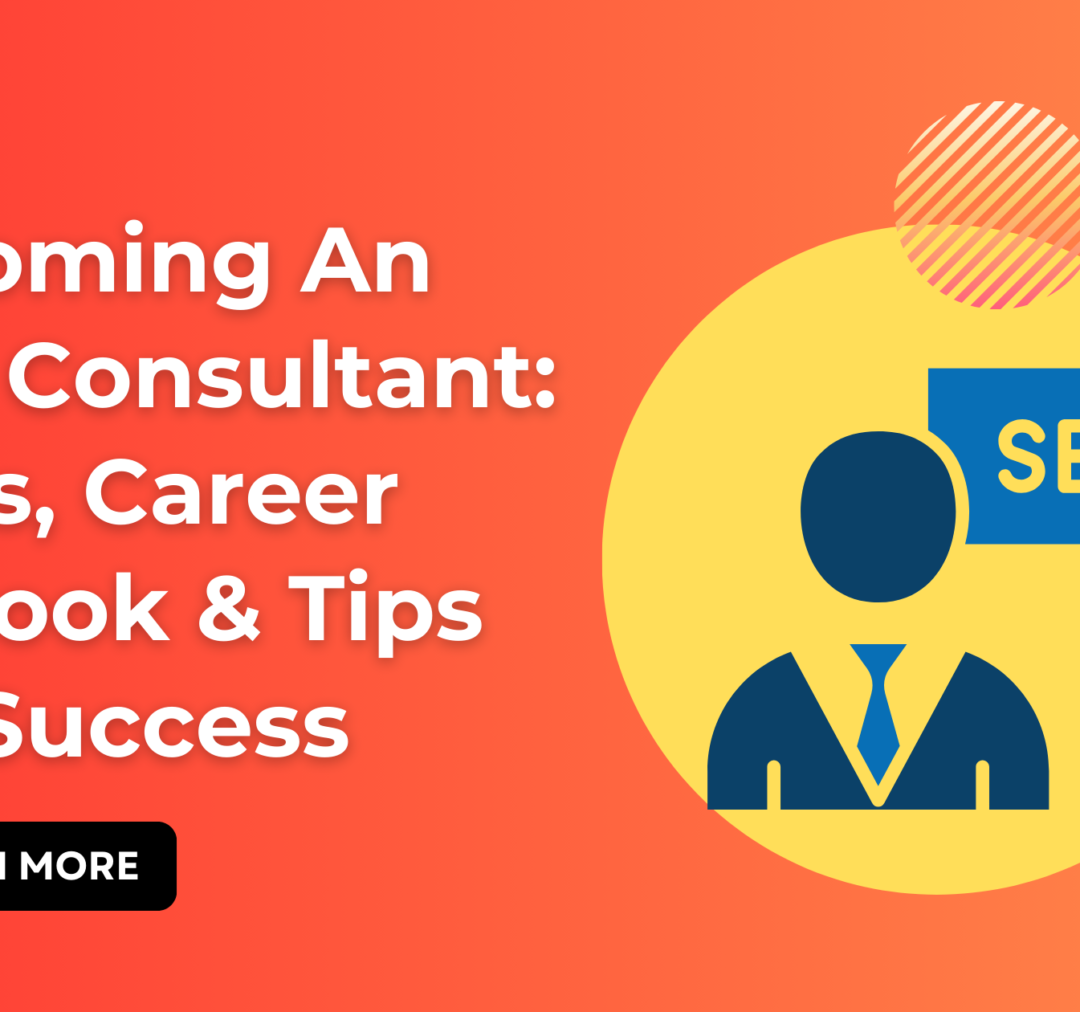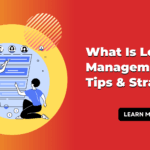With the digital world growing at an unprecedented rate, businesses are in a constant race to dominate search engine rankings. This has led to a massive demand for SEO professionals who can optimize websites and drive organic traffic. If you’ve ever wondered how websites land on Google’s first page, an SEO consultant is the mastermind behind it. What then does an SEO consultant specifically do? How do you become one? What SEO skills are essential? And, most importantly, is this a profitable career choice?
This blog will walk you through everything you need to know about becoming an SEO professional, from required skills to career outlook, job roles, and expert tips to grow in this competitive field.
What Does an SEO Consultant Do?

An SEO consultant is a specialist who helps businesses improve their website’s visibility on search engines like Google. Unlike an SEO executive means someone who works under a team leader, an SEO consultant independently strategizes, executes, and optimizes websites to boost rankings.
Core Responsibilities of an SEO Consultant
An SEO consultant’s responsibilities can be broadly categorized into:
- Keyword Research & Strategy – Finding high-impact keywords and incorporating them naturally into content.
- On-Page Optimization – Optimizing meta titles, descriptions, headers, and content to improve rankings.
- Technical SEO – Ensuring websites are mobile-friendly, fast-loading, and properly indexed by Google.
- Off-Page SEO & Link Building – Off-page SEO entails obtaining high-quality backlinks from trusted websites.
- Analytics & Performance Tracking – Using tools like Google Analytics and Google Search Console to track and improve performance.
SEO Skills You Need to Become an Expert
SEO isn’t just about stuffing keywords into content and hoping for the best. It’s an ever-evolving game where you need a strong set of skills to stay ahead.
1. Technical SEO
To be a great SEO professional, you must first understand how websites work.
- You should know how website architecture, indexing, and crawling impact SEO.
- Mobile-friendliness is a major ranking factor, so ensuring a responsive design is crucial.
- Page speed optimization and fixing core web vitals can make or break a website’s rankings.
2. On-Page SEO
Writing for humans while optimizing for search engines is a skill every SEO consultant must master.
- Keyword research & placement – You need to sprinkle keywords like “SEO skills” and “expertise SEO” naturally within content.
- Meta titles & descriptions – Crafting compelling meta tags boosts click-through rates.
- Content structuring – Using proper H1, H2, and H3 tags makes content easier to read for both users and search engines.
3. Off-Page SEO
No website can rank without a strong backlink profile. As an SEO expert, you need to:
- Earn high-quality backlinks from authoritative websites.
- Leverage guest posting and content outreach to build credibility.
- Use social media signals to boost visibility and engagement.
4. Analytics & Reporting
Data is your best friend when working in SEO.
- Track indexing problems with Google Search Console.
- Track performance with Google Analytics.
- Conduct competitor analysis to refine SEO strategies.
How to Become a Successful SEO Consultant?

Becoming a successful SEO consultant isn’t just about understanding keywords and backlinks—it’s about problem-solving, staying ahead of trends, and continuously adapting to changes in search algorithms. If you want to establish yourself as an SEO pro, you need to build your expertise, get hands-on experience, and position yourself as an authority in the industry.
Let’s break it down step by step:
1. Get Certified & Build Expertise
One of the biggest myths in SEO is that you need a degree to become an expert. The truth? SEO is a skill-based profession—the more you learn and practice, the better you get. However, certifications can add credibility to your profile, especially when you’re just starting out.
Here are some highly recommended certifications that can strengthen your SEO foundation:
- Google Analytics & Search Console Certifications
- HubSpot Content Marketing Course
- SEMrush SEO Fundamentals Course
2. Gain Hands-on Experience
SEO is not a theory-based subject—it’s a field where real-world application matters more than textbook knowledge. You can memorize every SEO definition out there, but if you don’t get your hands dirty with practical experience, you won’t be able to rank a website successfully.
a) Create Your Own Website & Try Ranking It
If you’re serious about becoming an SEO professional, build your own website. Nothing teaches SEO better than working on your own project.
Here’s what you can do:
- Pick a niche you’re interested in (e.g., travel, finance, tech).
- Do keyword research and create SEO-optimized content.
- Experiment with on-page SEO, such as optimizing meta tags, headlines, and internal linking.
- Learn technical SEO by improving page speed and mobile-friendliness.
- Try off-page SEO by building backlinks through guest posts.
By the time you successfully rank your own website, you’ll have real proof of your SEO skills—something no certification can replace!
b) Offer Free SEO Audits to Small Businesses
Start by helping local businesses or startups that have poorly optimized websites. Offer them a free SEO audit to gain experience. This will:
- Help you understand real-world SEO problems.
- Build case studies that you can showcase in your portfolio.
- Give you hands-on experience working with clients.
Most businesses don’t even realize they have SEO issues until someone points them out. If you provide value for free initially, many of them might hire you later for paid SEO services.
c) Work on Freelance Projects
Websites like Upwork, Fiverr, and PeoplePerHour are filled with SEO job listings. Apply for small gigs like:
- Keyword research tasks
- Writing SEO-optimized articles
- Website SEO audits
- Basic backlink-building campaigns
Even if these gigs don’t pay much at first, they add to your experience and portfolio—which will help you land higher-paying SEO projects in the future.
3. Stay Updated with SEO Trends
SEO is not a set-it-and-forget-it field. Google updates its algorithm hundreds of times a year, which means what worked six months ago might not work today. If you don’t stay updated, you’ll end up using outdated SEO tactics, which can actually hurt rankings instead of improving them.
Here’s how you can keep up with SEO changes:
a) Follow SEO Industry Blogs & Websites
The best SEO professionals learn from the best. Some must-follow SEO blogs include:
- Google Search Central Blog – Official Google SEO updates straight from the source.
- Moz Blog – Great for SEO insights, case studies, and technical SEO breakdowns.
- Ahrefs Blog – Focuses on practical SEO strategies, keyword research, and link-building tactics.
- SEMrush Blog – Ideal for learning about content marketing and paid search strategies.
b) Follow SEO Experts on Twitter & LinkedIn
Many SEO professionals share valuable tips, algorithm updates, and ranking strategies on Twitter and LinkedIn. Among the top SEO consultants to follow:
- John Mueller (@JohnMu) – Google’s Senior Search Analyst (shares Google ranking tips).
- Neil Patel (@neilpatel) – Digital marketing & SEO expert.
c) Test & Experiment with SEO Strategies
Never blindly follow SEO advice—test it yourself.
For example:
- Does increasing content length improve rankings? Try it and track results.
- Does changing meta descriptions affect click-through rates? Analyze it in Google Search Console.
- Do backlinks from social media profiles help SEO? Test different platforms and compare.
4. Build a Strong Portfolio & Personal Brand
Your personal brand is your strongest marketing tool as an SEO consultant. Businesses won’t hire you just because you say you’re good at SEO—they need proof. Here’s how you can establish authority and stand out in the SEO industry:
a) Write SEO Blogs to Showcase Your Knowledge
Start a blog where you share SEO insights, case studies, and ranking experiments. Some content ideas:
- “Top 5 SEO Mistakes That Kill Your Website’s Traffic”
- “Google’s Latest Algorithm Update – What It Means for Your Website”
b) Publish SEO Case Studies on LinkedIn
LinkedIn is a goldmine for SEO professionals. Share your SEO success stories, like:
- How you helped a business increase organic traffic.
- How a small tweak in page speed improved rankings.
- How you ranked a blog post for high-volume keywords.
c) Network with Fellow SEO Professionals
Success in SEO is not just about what you know—but who you know. Connect with other SEO professionals on LinkedIn, Twitter, and SEO forums.
- Engage in SEO discussions.
- Ask questions and share insights.
- Attend SEO conferences and webinars.
FAQs
Q1. What is the difference between an SEO consultant and an SEO executive?
Ans: An SEO executive means someone who executes pre-planned SEO strategies, while an SEO consultant designs and customizes SEO strategies.
Q2. Can I become an SEO consultant without coding knowledge?
Ans: Yes! While basic HTML knowledge helps, most SEO tasks don’t require coding.
Q3. How long does it take to become an SEO pro?
Ans: With dedicated learning, you can become proficient in 6-12 months.
Q4. What are the best tools for SEO professionals?
Ans: Some must-have tools include Google Search Console, Ahrefs, SEMrush, and Moz.
Q5. How much can an SEO consultant earn in India?
Ans: A freelance SEO consultant can earn between ₹6 LPA to ₹20 LPA, depending on expertise.
Conclusion
Becoming a successful SEO consultant is a journey of learning, experimenting, and adapting to constant changes in the digital world. With businesses competing fiercely for online visibility, mastering SEO skills can open doors to unlimited career opportunities. Whether you choose to work as a freelancer or with an agency, expertise in SEO professional strategies will always be in demand.
At Prashantji Services, we understand the power of SEO in transforming businesses. Our team of experts helps brands dominate search rankings with proven strategies and innovative techniques. If you’re passionate about SEO, start by building your expertise, testing new strategies, and networking with industry leaders—because the future of digital success belongs to those who rank higher!








